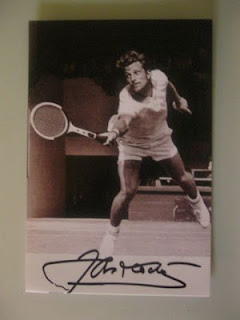 Jan Kodeš
Jan Kodeš (
Czech:
Jan Kodeš; born March 1, 1946, in
Prague,
Czechoslovakia) is a right-handed
Czech former
tennis player who won three
Grand Slam events in the early 1970s.
Kodeš's greatest success was on the clay courts of the French Open. He won the title there in 1970, beating
Željko Franulović in the final, and in 1971, defeating
Ilie Năstase in the final.
He also won
Wimbledon on
grass in 1973, although 13 of the top 16 players, and 81 players in total, did not play the tournament
that year because of a boycott over the ILTF banning
Nikola Pilić from that Wimbledon. Kodeš beat home favorite
Roger Taylor in the semifinals 8–9, 9–7, 5–7, 6–4, 7–5 and
Alex Metreveli in the final 6–1, 9–8, 6–3.
Kodeš never played the Australian Open but he was twice the runner-up at the
US Open, in 1971 and 1973.
Kodeš reached his highest tour ranking of World No. 4 in September
1973. During his career, he won a total of 8 top-level singles titles
and 17 doubles titles.
He was inducted into the
International Tennis Hall of Fame in 1990, in 2013 he received Czech fair play award from Czech Olympic Commitee.

We spoke at the First Czech Lawn Tennis Club on Prague’s Štvanice
island, which he joined at the age of 13. When had his talent first come
to
attention?
“I started when I was 8 years old in a club near here. It was called
Čechie Karlín. But I mainly played soccer as a teenager. I played both.
And when I became number three in the Prague under 12s championship
somebody said, maybe he could play tennis.”
Tell me a bit about your background. I was reading that your father
was a
lawyer who was forced to work in a factory and also worked at the Čechie
tennis courts.
“Yes, that was in 1951, 1952. It was a period which was very, very
difficult for my parents.”
Was it an advantage to you that your dad was working at those
courts?

“I don’t think so. I was there just because of his job. But then when
I got my first prize, when I became number three in Prague in the under
12s, then my father decided I should go to this club here, to get a coach.
Because at that time there weren’t good coaches at the other small
clubs.”
Was it the case in those days that sports people had to have some
kind of
formal employment? So, for example, a soccer player would have to go in
the
morning to a factory and then clock in and leave again? Did you have to do
something like that?
“You’re talking about the guys who were no longer juniors, but I was
in school. And later on I was lucky and I got into the University of
Economics. So actually it was not like that, because I studied till I was
26.
“It was true that some sportsmen had to go to work in the morning and
they could practise in the afternoon. They were released, for example
three
or four hours early, to go for practice.”
Your greatest successes were your three Grand Slam titles. What are
your
strongest memories of your first Grand Slam title, the French Open in
1970?

“Well, the first Grand Slam title is always the most difficult one,
because you feel that you’ve achieved something that’s going to be in
history, because for a person who wins a Grand Slam title their name goes
down in history.
“Of course, I was very nervous. I remember I had gruelling, tough
matches in the third and fourth rounds, which were of five sets and took
almost four hours. One was against the Romanian Ion Tiriac, the other was
against the clay courter and very good Davis Cup player Francois Jauffret
from France.
“The final I actually won quite easily, against Zeljko Franulovic. But I
always remember the tough matches before the final.”
For many people around the world, perhaps in particular those who
aren’t
so interested in tennis, Wimbledon, which you won in 1973, is THE tennis
competition. Do players consider Wimbledon to be a greater tournament than
the other Grand Slams?
“Wimbledon has some kind of historical…thing because of the surface,
grass. In my time, three Grand Slams were played on grass: the US Open in
Forest Hills, the Australian Open in Kooyong and Wimbledon. The only event
played on clay was the French Open.
“So until today, the players have a feeling that Wimbledon is,
historically, something different from the other tournaments – because
it’s on grass.”
(radio.cz)

 Victor Crivoi (born May 25, 1982) is a Romanian tennis player who lives in Bucharest. In 2005, he played in the International Tennis Federation's
Professional Circuit and won seven titles.
Victor Crivoi (born May 25, 1982) is a Romanian tennis player who lives in Bucharest. In 2005, he played in the International Tennis Federation's
Professional Circuit and won seven titles.























